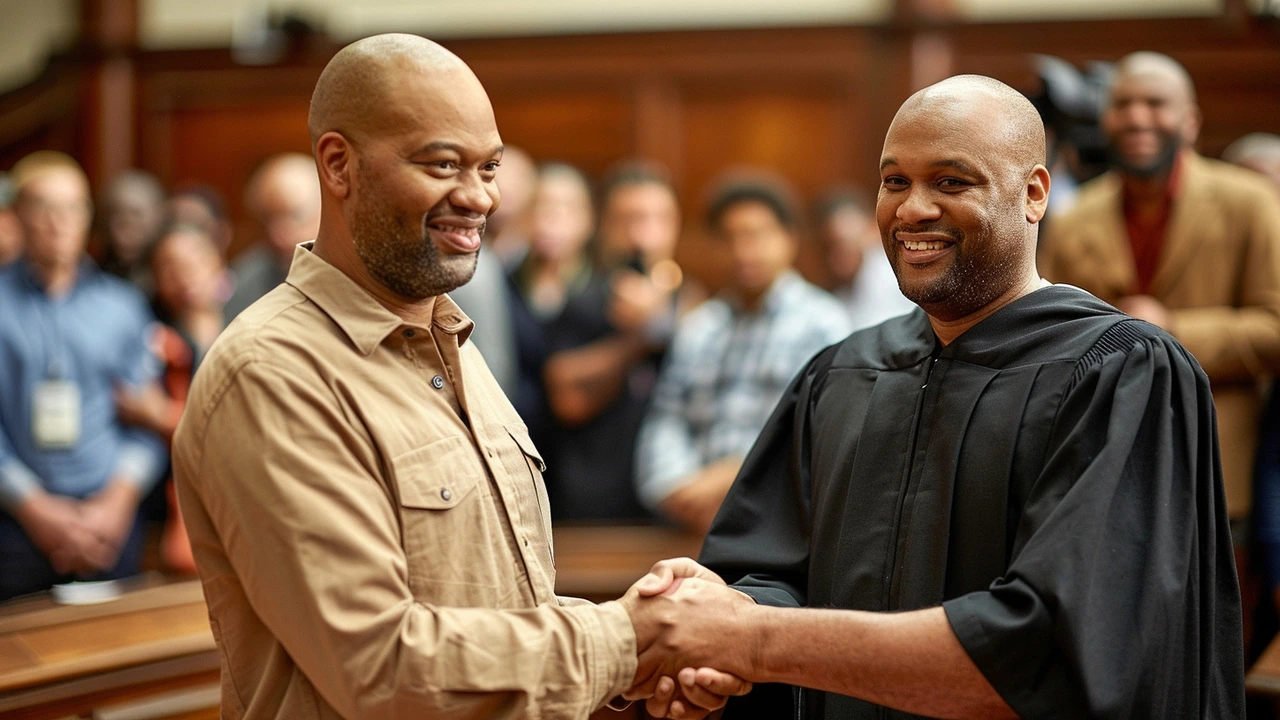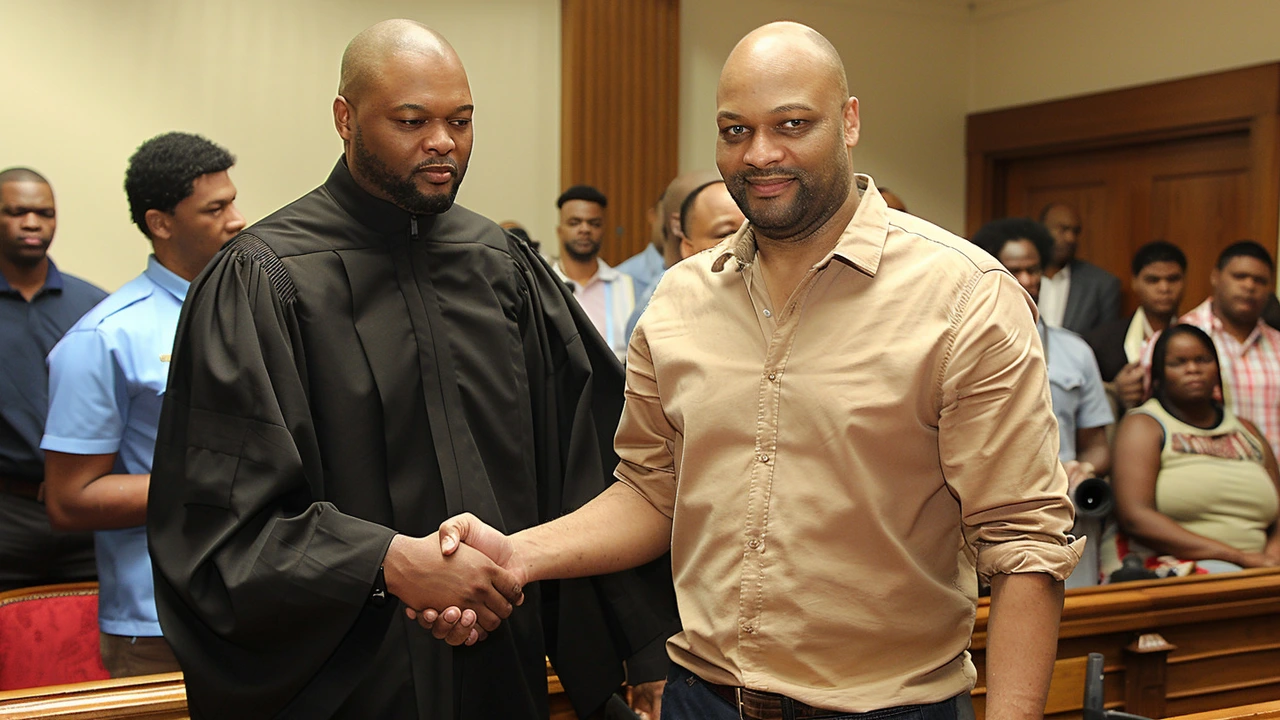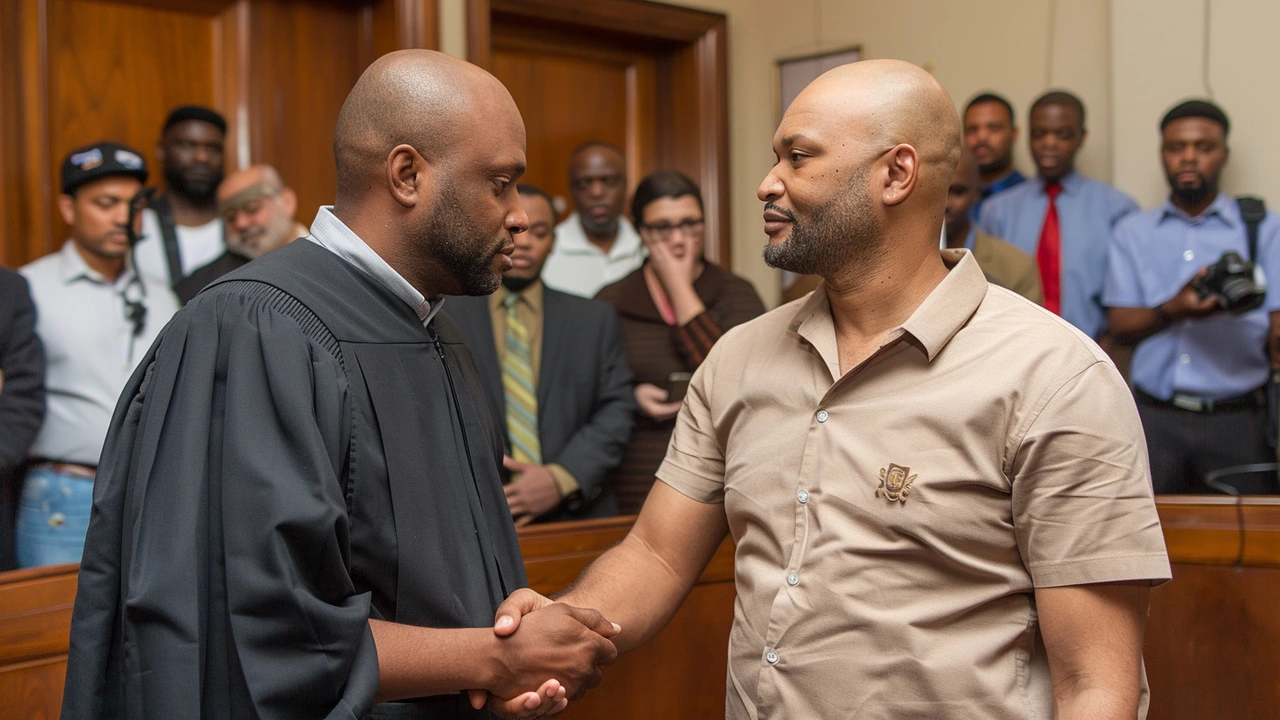Thabo Bester's Legal Troubles Escalate Amid Confidentiality Concerns
The legal saga of Thabo Bester, a convicted murderer and rapist, has taken yet another dramatic turn. The High Court in the Free State has postponed the case involving Bester and his eight co-accused to July 24 for another pre-trial hearing. This postponement isn't merely procedural; it shines a spotlight on the multifaceted complexities of the case, including serious allegations of compromised confidentiality.
Bester, who stands accused of masterminding a brazen prison escape, has been vocal about his grievances. He has alleged that his confidentiality was compromised, a claim that adds another layer of intrigue and concern to an already convoluted case. His co-defendants face charges of facilitating an inmate's escape and defeating the ends of justice, among other allegations. The stakes are incredibly high, not only for Bester but also for the broader criminal justice system in South Africa.
Legal Representation Woes
The courtroom ambiance took a surprising turn when Mohamed Seedat, Bester’s legal representative, announced his withdrawal from the case. Seedat cited difficulties in consulting with Bester and the financial strain of the case as the primary reasons for his withdrawal. This development leaves Bester in a precarious legal position, intensifying the drama surrounding the high-profile case. The financial and logistical challenges cited by Seedat underscore the immense pressure and difficulties faced by legal practitioners in high-stakes cases.
Bester has not taken the withdrawal of his lawyer lightly. During the court proceedings, he fervently informed the court of the difficulties he has faced with his now-former legal representative. This twist not only jeopardizes Bester’s defense strategy but also prolongs an already extended legal process, adding to the emotional toll on all parties involved.

Plea for the Death Sentence
In a deeply emotional moment, Bester made a dramatic plea for the imposition of the death sentence on him. He argued that he has been treated inhumanely and feels there exists what he called a 'Thabo Bester Act'—a notion suggesting that the legal system has singled him out for particularly harsh treatment. Bester's plea for the death sentence can be seen as both a cry for attention and a commentary on what he perceives as a prejudiced legal system. His plea raises significant ethical and legal questions about the treatment of inmates and the broader implications of capital punishment.
The public's reaction to Bester’s plea was immediately polarized. Some view it as an act of desperation from a man who believes he has been failed by the justice system, while others see it as a manipulative tactic designed to evoke public sympathy. Regardless of public opinion, Bester’s plea undeniably adds another layer of complexity to an already intricate legal proceeding.
Courtroom Drama and Future Proceedings
The adjournment to July 24 means the involved parties have another month to prepare, consult, and strategize. This interval is crucial, providing a window for new legal representation for Bester to be arranged, and for his co-accused to solidify their defense strategies. The additional time may also offer an opportunity for any alleged breaches of confidentiality to be thoroughly examined, ensuring that all parties receive a fair trial.
The postponement also amplifies the public and media scrutiny surrounding the case. As one of the most high-profile criminal cases currently unfolding in South Africa, it continues to capture the nation’s attention, eliciting widespread public interest and debate. From the intricacies of legal representation to the ethical questions raised by Bester’s plea for the death sentence, this case is multi-dimensional, affecting not just those directly involved, but also the broader societal context.

The Larger Implications
The Thabo Bester case serves as a microcosm of larger issues plaguing the criminal justice system in South Africa. Questions of legal fairness, the treatment of inmates, and the role of public opinion in legal matters are all thrown into sharp relief by this case. As the next court date looms, it is crucial for the justice system to navigate these challenges with integrity, ensuring that justice is not only done but is also seen to be done.
At the core of this convoluted legal drama is a man who feels that his rights have been trampled upon and who now stands at the crossroads of justice and desperation. Whether Thabo Bester will find a new legal representative or continue to face his charges without proper counsel remains to be seen. What is certain, however, is that his case will continue to be a focal point for discussions about justice, fairness, and the human condition.
Public Sentiment and Media Attention
The significant public and media attention on this case cannot be overstated. Thabo Bester has become a household name synonymous with controversy, and his legal battles are followed closely by many. News outlets, social media platforms, and public forums buzz with speculation, opinions, and ongoing discourse about the case. This media spotlight brings both benefits and challenges. While it ensures transparency and keeps the public informed, it also places additional pressure on legal parties and can sometimes skew public perception.
Bester's plea for the death sentence adds emotional weight to the case, making it not just a question of legalities but also of human empathy and ethical considerations. As the legal proceedings continue, the role of the media in shaping public opinion and the potential impact of that opinion on the case outcomes remain crucial considerations.
A Nation Watching and Waiting
As South Africa watches this legal drama unfold, the case of Thabo Bester will undoubtedly serve as a talking point for years to come. It encapsulates a range of societal issues, from the efficacy of the legal system to ethical questions about inmate treatment and capital punishment. The upcoming court dates promise more revelations, more debate, and perhaps, eventual closure.
In the end, the Thabo Bester case is more than just a legal proceeding; it is a narrative that reflects broader societal concerns and the perennial quest for justice. As we await the next court date, the nation is left to ponder the intricate complexities that define this high-profile case and the ultimate quest for a fair and just resolution.


Diego Vargas
Looks like the confidentiality breach in Bester's case is more than just a procedural hiccup. When a high‑profile defendant claims his private communications were leaked, it raises red flags about the integrity of the court's docket. The fact that his lawyer pulled out citing financial strain only muddies the water further. The legal system needs airtight protocols, otherwise cases get delayed and public trust erodes. Plus, the media frenzy around Bester only amplifies the pressure on judges and attorneys alike.
Alex Lee
Bester's drama is just a circus for the media.
James Lawyer
The recent adjournment underscores the delicate balance between procedural fairness and public scrutiny. Ensuring that confidentiality is preserved is paramount to upholding the defendant's right to a fair trial, especially in a case that attracts widespread attention. Moreover, the withdrawal of counsel highlights systemic challenges faced by legal practitioners handling complex criminal matters. It is essential that the judiciary implements robust safeguards to prevent future breaches and to maintain confidence in the legal process.
Vida Yamini
I hear what you’re saying and I think it’s a crucial point that many overlook.
The legal system in South Africa has been under a lot of pressure lately and cases like Bester’s bring that to the fore.
When a defendant feels that his privacy has been violated it can erode trust not just for him but for the public as a whole.
Confidentiality is a cornerstone of any fair trial and any breach should be taken seriously.
The court’s responsibility is to protect that right while also being transparent to a populace that wants answers.
It’s a tough balancing act but it’s not impossible with the right protocols in place.
Legal representatives need support too because they are often caught between client demands and procedural constraints.
Financial strain, as mentioned by Seedat, can limit their ability to mount a robust defense.
That’s why funding mechanisms for public defence are so important.
At the same time the media should temper sensationalism because it can influence perceptions before a verdict is reached.
A measured approach from journalists would help keep the focus on facts rather than drama.
If the confidentiality breach is proven, there should be clear consequences to deter future lapses.
Overall the system benefits when all parties-judges, lawyers, media, and the public-work together responsibly.
I’m hopeful that the upcoming July hearing will give everyone time to address these concerns properly.
The hope is that justice can be served without compromising rights or integrity.
In the end a fair outcome strengthens confidence in the rule of law for everyone.
Abby Culbertson
i feel bad for bester even tho he did bad stuff, the system should still be fair. the media hype just makes everything harder.